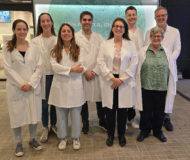

The Sant Pau Research Institute (IR Sant Pau) has approved the creation of the new research group Gynecological and Breast Pathologies, focused on studying the main gynecological and breast diseases, both benign and malignant. The group is coordinated by Dr. Silvia Cabrera, a specialist in gynecologic oncology, who will lead this new unit with the aim of integrating care, teaching, and research through a multidisciplinary and translational approach.
Dr. Cabrera holds a degree in medicine and surgery from the University of Barcelona and is a specialist in gynecology and obstetrics. She has developed her professional and research career in the field of gynecologic oncology and gynecologic surgery, with a prominent focus on the prevention, diagnosis, and treatment of gynecologic and breast cancer. She is currently Clinical Head of Gynecology at Hospital de Sant Pau and has extensive research and teaching experience, reinforcing the leadership of this new group.
Gynecological and breast pathologies have a major impact on women’s health. The incidence of certain gynecologic and breast cancers is expected to increase, linked to growing exposure to environmental risk factors. At the same time, there is an increasing need to address diseases that have long been overlooked, such as uterine fibroids, endometriosis, and infertility, which significantly affect patients’ quality of life. In this context, the new group aims to generate specific knowledge and promote research lines that help better understand these pathologies and improve strategies for prevention, diagnosis, and treatment.
The group’s research is structured into three main lines. The first focuses on gynecologic and breast neoplasms, with particular attention to cancers of the endometrium, ovary, cervix, vulva, and vagina, as well as breast cancer and precancerous lesions that may progress to malignancy. The second line addresses benign pathologies with a high impact on women’s quality of life, such as endometriosis, uterine fibroids, chronic pelvic pain, or genital prolapse, which, although not life-threatening, can severely impact physical, reproductive, and emotional well-being. Finally, the third research line focuses on gynecologic and reproductive endocrinology, with special interest in hormonal disorders related to fertility, the menstrual cycle, and ovarian function.
“The creation of this group represents a step forward in raising awareness of and responding to diseases that directly affect women’s lives, both in the oncologic field and in the context of benign pathologies,” says Dr. Cabrera.
The research will take place in a high-complexity hospital environment, where knowledge generation is inseparable from clinical care and teaching. The commitment to a multidisciplinary and translational approach will ensure that scientific advances are rapidly transferred to clinical practice. The goal is to improve the prognosis of patients with malignant diseases and the quality of life of those living with benign conditions.
According to Dr. Cabrera, “Our goal is to integrate research with clinical care and the training of new professionals, to ensure that scientific progress has a real and positive impact on our patients’ health.”
The team joining Dr. Cabrera in this new stage includes doctors Josep Estadella, Alba Farres, Misericordia Guinot, Rocio Luna, Taisiia Melnychuk, Irene Mora, Josep Perelló, Marta Peró, and Ramon Rovira. Their joint work will strengthen Sant Pau’s commitment to research excellence and to generating knowledge that directly benefits women and society as a whole.
This new line of work will strengthen research in a field of high prevalence and direct impact on the quality of life of thousands of women. It will also promote the training of specialized professionals and collaboration with other national and international groups. Altogether, it aims to position IR Sant Pau as a leading center in biomedical research applied to women’s health. It highlights the importance of having research structures capable of anticipating healthcare challenges and translating scientific advances into the highest quality of care.